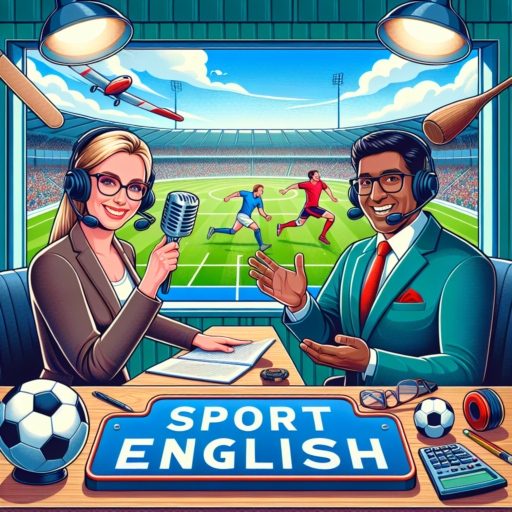Understanding Sport English: An Introduction
Sport English is a specialized language that combines the global passion for sports with the universal nature of English. It encompasses a wide array of terms, phrases, and #idioms that are essential for anyone looking to fully appreciate or engage in sports discussions, broadcasts, and commentary. This introduction aims to highlight the significance of mastering Sport English, whether you are an avid sports fan, a budding sports journalist, or simply someone keen on enhancing your English vocabulary in a fun and engaging manner.
The vocabulary of Sport English is rich and varied, reflecting the diverse and dynamic world of sports. From football to cricket, athletics to tennis, each sport brings its own set of terminologies that are integral to understanding and discussing games and matches. Learning these terms not only enriches your language skills but also deepens your appreciation of the sport. For non-native English speakers, Sport English serves as a practical entry point into both the sport they love and the English language, bridging cultural and linguistic gaps.
Beyond just vocabulary, Sport English is imbued with idiomatic expressions and slang that give color to sports commentary and analysis. Phrases like «out of left field» (unexpected), «hit it out of the park» (do something spectacularly well), or «down for the count» (defeated) have transcended their sports origins to become common in everyday English language. Understanding these expressions within their sports context provides a deeper insight into the language and culture of English-speaking sports communities.
The Importance of Learning Sport English for Athletes and Fans
Understanding the global language of sports, particularly English, carries significant benefits for both athletes and fans alike. English has established itself as the lingua franca in various international sports arenas, making it crucial for engaging with a wider audience and fostering an inclusive global sports community.
Enhancing Communication Across Cultures
For athletes, mastering Sport English is not just about excelling in interviews or press conferences. It’s about breaking down barriers, building relationships with teammates, coaches, and fans from around the world. By learning the nuances of Sport English, athletes and fans can enjoy a deeper connection to the games they love, irrespective of their native language. This linguistic skill significantly enhances cultural exchange and mutual respect among the global sports fraternity.
Access to Global Sports Media
With the majority of international sports coverage presented in English, possessing a strong grasp of Sport English enables fans to access a broader range of information, including live commentaries, in-depth analyses, and exclusive interviews. This access enriches the sporting experience, offering insights and perspectives that might otherwise be unavailable due to language barriers. For athletes, such knowledge not only keeps them informed about their sport but also allows them to engage directly with media content that can influence their professional growth and public image.
Top Terms in Sport English Every Fan Should Know
Sporting events unite fans from around the globe, transcending cultural and linguistic barriers. However, the language of sports, particularly terminology unique to English, can sometimes pose its own set of challenges for fans. Bringing you closer to the action and enhancing your watching experience, understanding these top terms in sport English is a must for every enthusiast.
Offside, a term often heard in football (soccer), can be puzzling for new fans. It refers to a situation where a player is in a position nearer to the opponent’s goal line than both the ball and the second-last opponent, including the goalkeeper, at the moment the ball is played to them. This rule helps to maintain fairness and strategy in the game. Similarly, in American Football, ‘Touchdown’ is a fundamental term, awarded when the ball is carried or caught in the opposing team’s end zone, scoring six points.
In basketball, ‘Slam Dunk’ is a dramatic, high-scoring shot made by jumping and slamming the ball through the hoop from above. It’s a move that energizes both the player and their supporters. Meanwhile, in baseball, a ‘Home Run’ is achieved when the batter is able to circle all the bases and reach home plate safely in one play, often propelling their team to victory.
No se han encontrado productos.
Improving Your Sport English: Tips and Techniques
Improving your Sport English can open numerous doors for engaging more profoundly in the sports community, be it through understanding commentary better, communicating more effectively with team members, or simply enjoying sports literature and media in English. Here are some targeted tips and techniques to enhance your sports-related English skills.
Engage with Sports Media
One of the most effective ways to improve your Sport English is by immersing yourself in sports media. This includes watching sports broadcasts, listening to podcasts, and reading sports news. Pay special attention to the terminology used during live games and broadcasts. Make notes of new terms and phrases and try to use them in contexts such as discussions or while summarizing a game. This practical application of language can significantly boost your comprehension and vocabulary.
Join Sports Communities and Forums
Another practical tip is joining English-speaking sports communities and forums online. Engaging in discussions about your favorite sports, teams, or players can be incredibly beneficial. It allows you to practice writing and reading in English in a context you are passionate about, which makes learning more enjoyable and relevant. Through such interactions, you gain exposure to colloquial language and slang related to sports, which are often not taught in traditional language courses.
Remember, the key to improving your Sport English lies in consistent practice and genuine interest. By integrating these tips and techniques into your learning routine, you’ll not only enhance your language skills but also deepen your appreciation and understanding of the sports world.
Sport English in the Media: Analyzing Commentary, Interviews, and Reports
The significance of English in the realm of sports media cannot be overstated. From live commentary to post-match interviews and detailed reportage, the use of the language extends far beyond mere communication. It is an art form that mediates the global passion for sports, making matches and athletes’ insights accessible to millions of fans worldwide. As we delve into sports English in the media, it’s vital to dissect how different formats serve unique purposes in engaging the audience and enhancing their viewing experience.
The Art of Live Commentary
Live commentary in English has the power to transform the viewing experience by adding layers of excitement and emotion to the game. Commentators skillfully weave a narrative around the match, punctuating their speech with technical insights, historical context, and sometimes, a touch of humor. Their linguistic dexterity not only conveys the ebbs and flows of the game but also builds a rapport with the audience, making each match an inclusive and memorable event.
Behind the Scenes: Interviews and Reports
Post-match interviews and in-depth reports are crucial for providing insights that go beyond the game’s surface. In these formats, English serves not just as a medium of communication but as a bridge that connects fans with the athletes’ thoughts and emotions. Interviews reveal the person behind the athlete, offering glimpses into their mindset, reactions, and personal reflections on the game’s outcome. Meanwhile, reports in English meticulously detail the game’s highlights, strategies employed, and pivotal moments, enriching fans’ understanding and appreciation of the sport.
Each of these media formats—commentary, interviews, and reports—play a pivotal role in the sports landscape, with English at the heart of this intricate dance. Their collective aim is to amplify the joy of sports, making it a shared global language that unites people across different cultures and backgrounds. As we analyze sport English in the media, it’s apparent that its influence extends far beyond the functional; it is a vibrant thread woven into the very fabric of the global sports narrative.
How to Practice Sport English: Engaging with Sports Content
Improving your Sport English can significantly enhance your understanding and enjoyment of international sports events. Engaging with sports content is not only about following your favorite teams or athletes but also about immersing yourself in the language and culture of sports internationally. Whether you’re a sports enthusiast looking to sharpen your vocabulary or a language learner aiming to combine your interests, this guide outlines practical strategies to get you started.
Follow Sports News in English
One effective method to practice Sport English is by regularly following sports news on websites, podcasts, and TV channels that broadcast in English. This daily habit allows you to familiarize yourself with common sports terminology and idiomatic expressions used by native speakers. Pay special attention to match summaries, player interviews, and analytical discussions, as these are rich sources of sports-specific vocabulary and phrases.
Participate in English Sports Forums and Social Media
Becoming an active member of English-speaking sports forums and social media groups can provide a real-time learning environment. Participate in discussions, ask questions, and share your opinions on recent games or sports news. This interaction not only helps in learning sport-related vocabulary but also improves your reading and writing skills in a dynamic, informal context. Engaging with sports content through social media also offers the chance to experience different dialects and slang used in various English-speaking countries.
Remember, the key to learning Sport English through engaging with sports content is consistency and active participation. By integrating these activities into your daily routine, you will not only expand your sports vocabulary but also gain a deeper appreciation of the global sports culture.
The Role of Sport English in International Competitions
In the realm of international sports, where athletes and officials from diverse linguistic backgrounds come together, the role of Sport English emerges as a vital lingua franca. This specialized version of English paves the way for clear communication, ensuring that rules are uniformly understood and that interactions among participants are smooth and inclusive. The universality of English in international competitions breaks down barriers, fostering a more connected and fair play environment.
Sport English isn’t merely about vocabulary; it’s about conveying the spirit of the game and ensuring that cultural nuances and technical terminologies are accessible to all. From the referees’ instructions to the announcements for audiences, Sport English standardizes communication, making the international competitions not just competitions but also celebrations of unity and diversity. It plays a crucial role in press conferences, interviews, and even in the strategic discussions between coaches and their teams, ensuring that every participant, regardless of their native language, is on equal footing.
The adoption of Sport English in international competitions has also led to the development of training programs and courses aimed at athletes, coaches, and officials. These educational initiatives strive to equip participants with the necessary linguistic tools to engage fully and effectively in the global sporting arena. The emphasis on Sport English underlines the importance of inclusivity and mutual understanding in sports, mirroring the broader global trend towards intercultural communication and cooperation.
Online Resources and Courses for Learning Sport English
Embarking on the journey to learn Sport English online opens up a world of opportunities for enthusiasts and professionals alike. With an ever-growing plethora of online resources and courses, individuals can easily find tailor-made solutions that fit their learning style and objectives. Whether you’re looking to improve your vocabulary for casual conversations about sports or aiming to excel in professional sports commentary, the digital landscape is rich with options.
Among the most valuable resources are dedicated Sport English platforms that focus exclusively on the vernacular and intricacies of sports language. These platforms often offer interactive lessons, real-life scenario practices, and vocabulary drills tailored to various sports such as football, basketball, and tennis. Moreover, engaging with these online courses enables learners to understand cultural nuances and slang, which are pivotal in real-world sports discussions and broadcasting contexts.
Additionally, many acclaimed language learning websites have recognized the niche for Sport English and have thus integrated specific modules or tracks focusing on sports vocabulary and communication skills. These modules are designed with flexibility in mind, accommodating learners at different proficiency levels. Through structured lessons, quizzes, and forums for interaction, students not only learn sport-specific terminology but also gain the confidence to use it in practical settings. Emphasizing practical usage, these resources ensure that learners can swiftly apply their knowledge, whether it’s in writing sports articles, engaging in discussions or even pursuing a career in sports journalism or commentary.
Case Studies: How Sport English Enhanced My Viewing Experience
Exploring the impact of sport English on my personal viewing experience has been a revelation, transforming not just how I watch sports, but also how I connect with them. From football to cricket, the nuances of the language used in commentary and analysis have deepened my understanding and enjoyment of games. It’s intriguing to see the universal power of English in bringing diverse fans together, breaking down barriers, and fostering a global sports community.
The first case study involves football commentary. The precision and passion behind every word spoken in English by commentators have elevated my excitement and involvement in the matches. It’s not just the play-by-play narration, but the strategic expertise, historical contexts, and player insights that enrich the viewer’s experience. This aspect of sport English allows fans to not just watch, but feel every moment more intensely.
In the realm of cricket, the linguistic journey was equally enriching. The terms and phrases unique to cricket in English, like «googly,» «bouncer,» and «silly point,» are fascinating. Understanding these terms in English has added a layer of appreciation for the sport’s complexity and beauty. Moreover, the interviews and post-match analyses in English provide clear insights into the players’ mindsets, strategies, and emotions, making every match an immersive experience.
Through these experiences, it’s evident how sport English plays a crucial role in enhancing the viewing experience. It not only brings the game closer to the global audience but also enriches the game’s enjoyment through deeper insights and understanding. The journey of exploring sport English is a testament to the language’s power to unite and excite sports fans worldwide.
Common Challenges in Learning Sport English and How to Overcome Them
Learning Sport English can often present unique challenges to learners, predominantly because of its specialized vocabulary and dynamic usage in real-time events. However, understanding these hurdles is the first step towards mastering this engaging dialect of the English language. One prominent challenge is the vast array of terminologies unique to each sport. Whether it’s cricket, football, or basketball, every sport has its lingo, which can be perplexing for learners. To overcome this, immersion is key. Engaging with sport-specific content, such as live games, interviews, and commentary, can vastly enhance vocabulary acquisition and contextual understanding.
Another significant hurdle is the speed and spontaneity of spoken Sport English, particularly during live commentary. This can make comprehension difficult for learners. A useful strategy to tackle this challenge involves regularly listening to sports podcasts and watching replays of games with subtitles. This practice can help learners to gradually acclimate to the pace of speech and the quick shifts in conversation topics, which are common in sports broadcasting.
Moreover, the cultural nuances and idiomatic expressions used in sports can also be perplexing. Phrases like «out of left field» or «down to the wire» often leave learners puzzled. To navigate this, one can benefit from studying sports-specific colloquialisms and idioms through curated resources. Engaging with native speakers, online forums, and social media groups dedicated to sports enthusiasts can also provide valuable exposure to these expressions in context.



